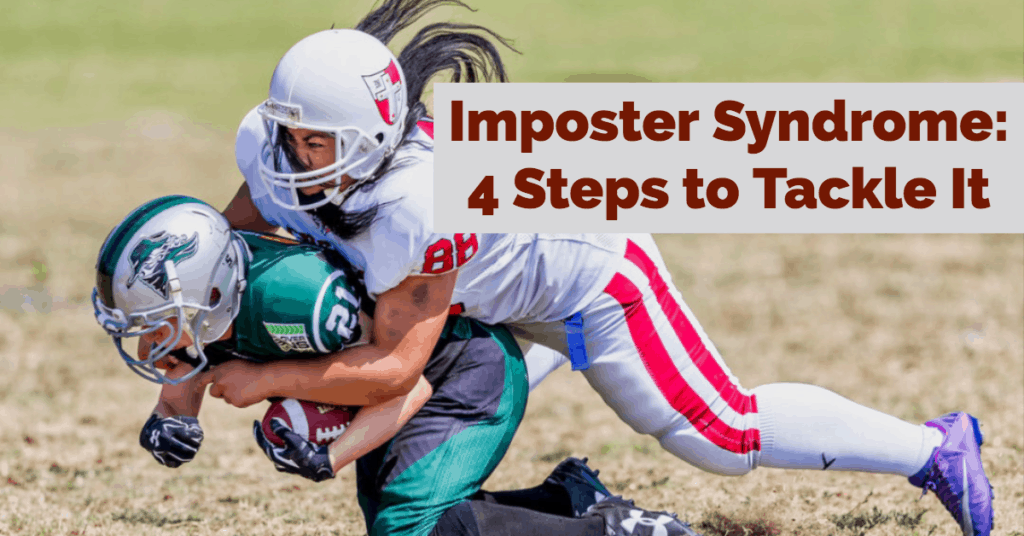
Imposter syndrome can hit the best of us. In my role as Lead Facilitator for Women Innovating Together (formerly Women of FileMaker), I often see this syndrome hitting women. But, men suffer from it too! Every small business owner has had a moment where it crept up on him. So, how do you tackle it?
First, let’s define what imposter syndrome is. According to Wikipedia, it is a psychological pattern in which an individual doubts his or her accomplishments and has a persistent internalized fear of being exposed as a “fraud”. Now, anyone who says he hasn’t had this hit them – even if for a moment – is either not very self-aware, lacking in humility, overly confident, or isn’t stretching his wings very wide to fly.
My Imposter Syndrome Experience
We all have our moments of wondering whether or not you can do something you are undertaking. I’ve had more than one. But, I distinctly remember my ad agency job in Chicago. I jumped into my operations role with 6 employees. My manager, their prior manager, had doubts about many of their abilities. I needed to address those issues with those employees. Additionally, I had to fight the status quo with some very strong personalities to effect change.
About 2 months in, in the midst of hiring and firing and negative feedback from people who feared change, I had a sit-down talk with myself. “Do you think you can really do this? Who do you think you are trying to establish new systems with people who have been at this company for many years? Can new technology really help solve some of these problems? How do I even know if the technology I’m recommending will work? Are you strong enough to effect change here?”
That’s a lot of self-doubts! But, I looked myself in the mirror and said, “Stop it! You are doing this already. You have the experience and background to help this company. And yes, new technology can be a huge problem solver. And, you have tenacity and determination. So, stop questioning yourself.” And, I went on to grow and evolve with that company for another 9+ years.
So, what are some techniques to get through these imposter syndrome moments?
1. Acknowledge that everyone feels this way sometimes.
That’s right. Even famous, successful people suffer from imposter syndrome. The key is not letting it take over your whole psyche. Knowing that others who are also successful have moments of doubt is comforting. And, it lets you know that you are not alone.
2. Assess whether or not the concern is true.
Are you really in over your head? Do you really have no clue what you’re doing? Do you really think that your efforts will fail? Is there any empirical evidence that you aren’t working hard enough? Are you really not smart enough? Do you have a history of being wrong about these types of things? Should you really be afraid of failing?
Failing to be self-aware can be more damaging than imposter syndrome. And, acknowledging that you might fail is also fine. Most successful people also fail. You learn from failing. Now, I prefer to try to avoid it whenever possible, but it does happen. And, when it does, you have to fix it.
But, in all likelihood, there isn’t empirical evidence to support your imposter syndrome. I’m not a huge proponent of “fake it until you make it.” I’m more interested in not faking it at all. Because you don’t have to.
3. Start adulting.
Once you’ve established that the concern is false, you can start the adulting part of the process. Replace negative thoughts with positive ones. Seriously, we all are horrible to ourselves. We would never say those things in our brains to other people. So, stop saying them to yourself!
Make yourself a list, if you need to, of all the reasons that your self-doubt should be doubted. What’s your experience? What have you already achieved? How are things going, really? Think of your background, skill set, and character traits that make you who you are. And stop wallowing.
4. Make it happen.
Now, get in there and do the work. Because you already know you can. Imposter syndrome will be just another one of those things that you tackle and take out of the play.

Rinse and repeat!
Thanks John! Glad you enjoyed it and agreed – keep on doing it!
Whole heartedly agree with everything you said! When this starts to happen I have to visualize a Stop Sign and even say out loud STOP! Then I take a breath, look through my task list and roll-up my sleeves to dive back in to get things done.
That’s a great technique! We all so often undersell ourselves… to ourselves!